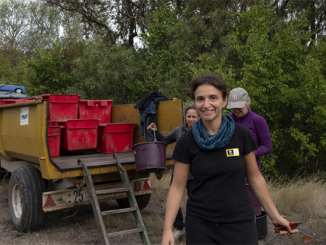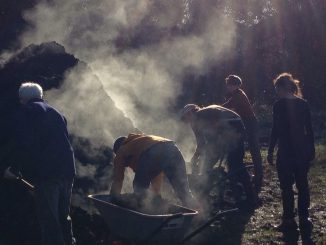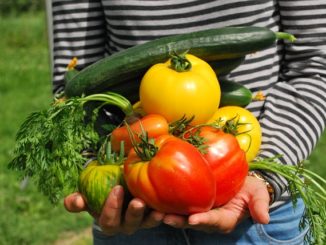Nelly Baltide, Brussels
On Sunday 20th March, the Big Everything Else Parade (Tout Autre Chose/Hart Boven Hard) took place in Brussels. Many alternatives to the business-as-usual austerity and corporate control agenda were represented, including the better food and farming brigade. Nele Baltide was there. Here’s her report – a fascinating snapshot of the great food initiatives happening on the ground in Belgium.

A powerful march full of colours, music, happiness and smiles brought upwards of 35,000 people to Brussels from all around the country. This event was an outcry for alternatives to the current model of society. The Big parade denounced short term perspectives and austerity policies, policies which prioritise competition between people, rampant individualism and the marginalisation of the weakest.
This was, however, a positive event about how to do things differently. The parade was organised by people and organisations with experiences and ideas about a cleaner, more humane, healthier and fairer world. A rainbow of alternatives walked hand in hand organised by themes, such as ‘a different economy’, ‘a different democracy’ but also ‘a different food and agriculture’.
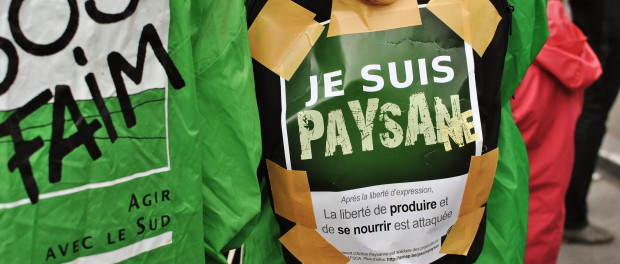
All dressed in green, the food and agriculture protagonists marched their beat on the street chanting the power of agroecology and the threat of the agro-business led model. All together, they incarnated the potential of alternatives bubbling in the city and throughout the country. Some of the great initiatives highlighted at the Big Parade included:
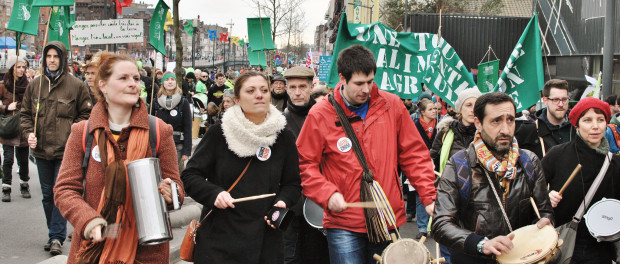
– A dynamic network of food community programmes and urban gardens all around the country: the region of Brussels alone counts 260 urban gardens (exclusive of private gardens) on 53 hectares. A fast growing phenomenon, reflecting people’s desire to know where their food come from and to feed themselves better. These initiatives help create social links in an urban context where anonymity and isolation can prevail. Brussels also contains an incredible number of food community supported programmes (commonly called GASAP) supporting short food chains and strengthening the direct link between inhabitants of the city and local producers from the region. The 1st groups appeared in 2006 and their rapid multiplication led to the creation of a food community programme network in 2007. Today, the Brussels network gathers more than 4000 people connected to 15 producers from the Brussels region. In 2009, the network received regional subsidies to finance a paid position of coordinator and now 3 people work for the network. Equivalent networks have developed successfully around the country in the regions of Wallonia (around 10000 members) and Flanders (around 3000 members).

– The agri-food belt (ceinture aliment-terre) around the city of Liège and soon in Brussels: The project in Liège was born in 2013 on the initiative of actors from different sectors: short food chains, social economy, territorial development, lifelong learning, all wishing for a profound transformation of the regional food system. In this area – one severely hit by the end of the coal mining golden age in the 70’s – dozens of local food projects have been initiated in recent years, from production to transformation, retail and access to land. Many citizens also came together in food cooperatives to show support for local agriculture. The agri-food belt is the platform that connects these initiatives and implements an action plan to help them develop further. Its overall objective is to offer a bigger market share for local, sustainable and fair food accessible to all at the level of the region of Liège. This helps with employment, local agriculture, social cohesion, food safety, public health and protection of the environment. Based on the example of Liège, a similar project is under development since last year for the region of Brussels, to connect local initiatives in this area and help them being accessible to all in the region.
– ‘Bloum Coop’, ‘Bees Coop’ Low waste and participative food marketplaces. These food cooperatives aim to improve access for local, low-waste and mostly organic food to the greatest number of people. They are slowly but surely blossoming in all parts of Brussels and share similar environmental-friendly and social values, to offer not only an alternative to supermarkets but also to the inflating number of ‘organic-fashion shops’, quite well spread around the city already but not necessarily fitting genuine sustainability principles due to the over-packaging, long-distance origin, and elitist pricing of the products they sell.
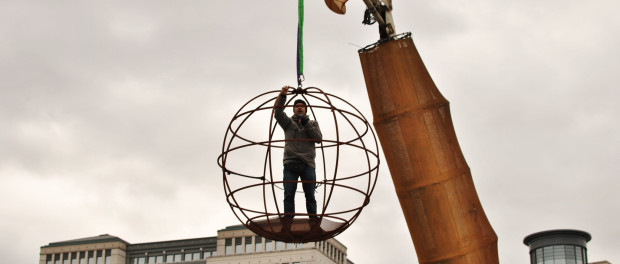
Just two days after the Big Parade, violence and intolerance hit Brussels. On 22nd March, a dramatic terrorist attack smashed the country, coming as a horrific follow-up of Paris events that killed hundreds of people. Since then the people of Brussels and Belgium feel sad and incensed by what happened.
But most of Belgians are not afraid. Its not that easy to knock them out! You understand why when youfeel the positive energy into the Big Parade and the practical desire to continue to implement all the alternatives aimed at changing our food system and society as a whole. Inside most Belgians burns a flame of solidarity – of freedom, joy and change. A minority of religious extremists will not make Belgians shake that easily. This applies equally to the 400 marginal hooligans who messed up the peaceful tribute to the victims, a few days after the attacks. They are a minority calling for hatred compared to a overwhelming number of peace makers, including the booming crowd mobilised to change the food system.
One may wonder why terrorists didn’t dare to attack the Big Parade, despite the easy target this jubilant walking multitude seemed to be. They may have not because this event was fearless. Walking, sharing, dancing and singing out loud its strong will for a change.
Out of fear doors open, connections happen and opportunities grow. Yes Belgium has been hurt, but the country and its people still have the capacity to overcome. Many Belgians are aware of role of the Belgian state, the EU and its member states in crystallising social inequalities, the extreme right movement and religious radicalisation. The Big Parade was about proposing alternatives to define a new society and, as part of this, a new food system within.
It is now time for political leaders to take stake of people’s call to profoundly transform a disfunctioning system. Most people feel safe within a constructive movement they have contributed to build up and in which they believe. And they will not easily allow its destruction.



